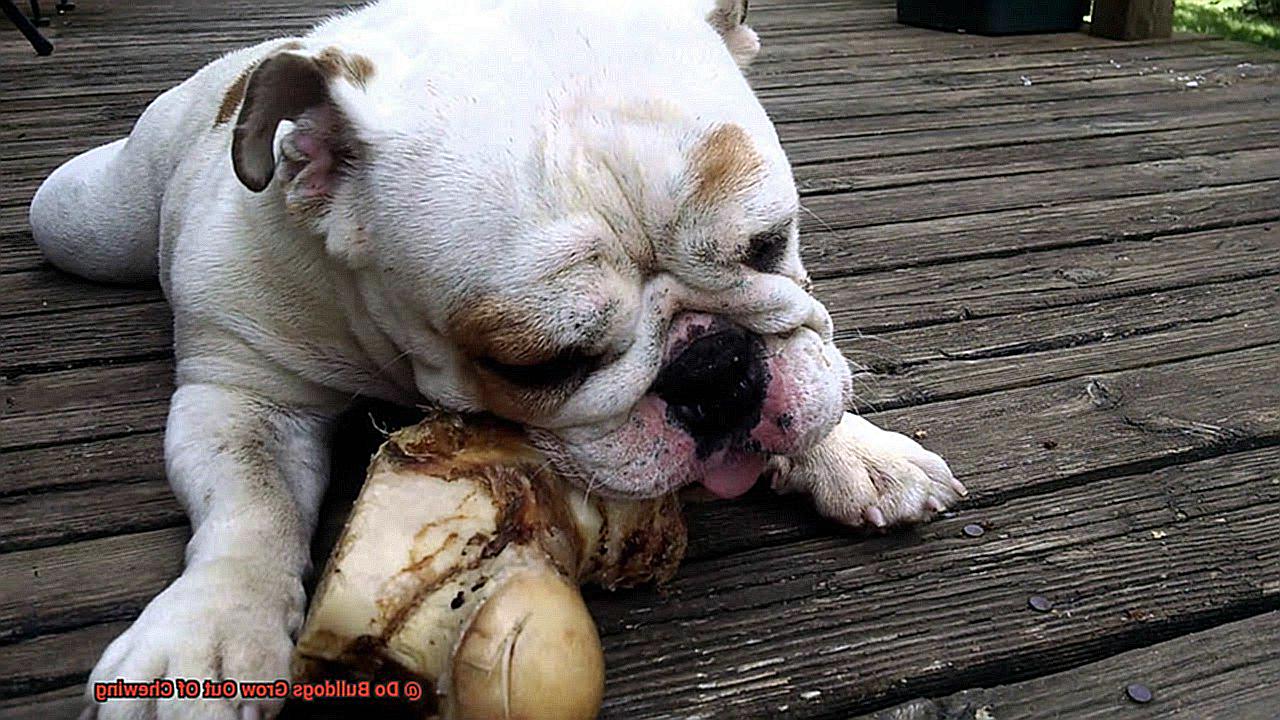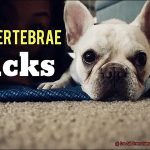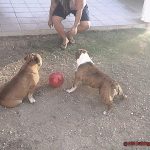Do Bulldogs Grow Out Of Chewing?
If you’ve ever owned one of these lovable goofballs, you know all too well about their chewing obsession. From mangled socks to chewed-up remotes, Bulldogs have a knack for sinking their teeth into just about anything. But here’s the burning question: do they ever grow out of it?
Today, we’re going on a deep dive into the world of Bulldogs and their chewing habits. So grab a snack, get cozy, and let’s uncover the truth behind this slobbery saga.
Understanding Bulldog Chewing Habits
Contents
- 1 Understanding Bulldog Chewing Habits
- 2 The Teething Phase and Chewing in Bulldogs
- 3 Providing Appropriate Chew Toys
- 4 Training and Positive Reinforcement Techniques
- 5 Mental and Physical Stimulation for Bulldogs
- 6 Separation Anxiety and Other Behavioral Issues
- 7 Managing Destructive Chewing in Bulldogs
- 8 Expert Opinions on Whether Bulldogs Grow Out of Chewing
- 9 Conclusion
If you own a French Bulldog, you may be all too familiar with their strong chewing habits. Bulldogs have a genetic predisposition to chew, and understanding the reasons behind this behavior can help you address it effectively. In this article, we delve into the world of Bulldog chewing habits, providing insights and tips for pet owners.
The Natural Instinct to Chew
Bulldogs have a natural instinct to explore and investigate their surroundings through chewing. This behavior is more prominent during their puppy phase but can continue into adulthood if not properly addressed. Chewing serves multiple purposes for Bulldogs, including teething relief, dental health maintenance, and mental stimulation.
Teething and Chewing
During the teething phase, which usually occurs between 3 to 7 months of age, Bulldogs experience discomfort as their adult teeth come in. Chewing helps alleviate this discomfort by providing a counter-pressure to their gums. Providing suitable chew toys and bones can help satisfy their need for teething relief while preventing them from damaging your furniture or belongings.
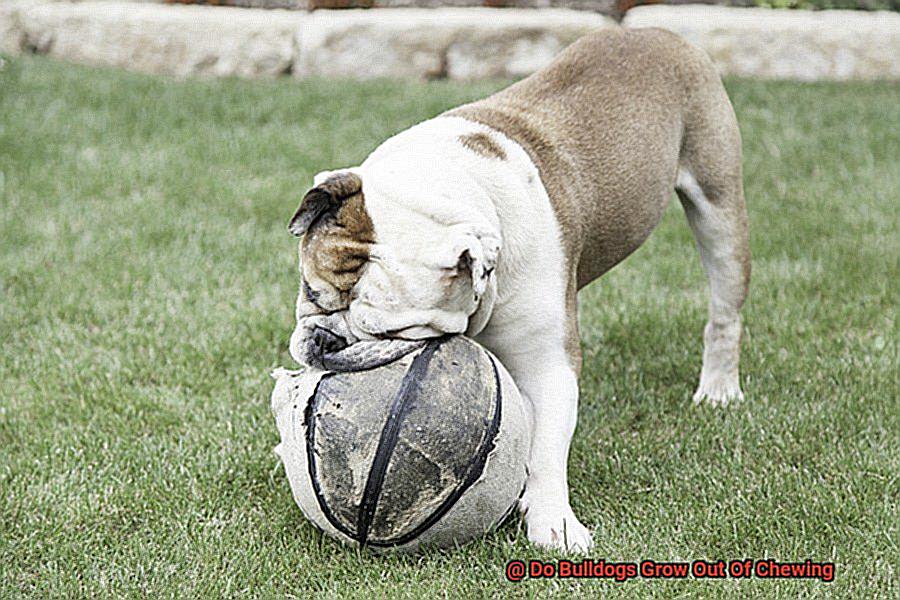
Dental Health Maintenance
Regular chewing also contributes to Bulldogs’ dental health. The act of chewing helps remove plaque and tartar buildup on their teeth, reducing the risk of dental diseases such as gum inflammation or tooth decay. Offering dental chews specifically designed for dogs can support their oral hygiene while giving them an enjoyable chewing experience.
Mental Stimulation
Chewing also provides Bulldogs with mental stimulation, keeping their minds engaged and preventing boredom. Dogs are intelligent creatures that need mental exercise just as much as physical exercise. By providing them with appropriate chew toys and interactive puzzle toys, you can keep them mentally stimulated and redirect their focus away from destructive chewing.
Addressing Destructive Chewing
While chewing is a natural behavior for Bulldogs, it can become problematic when they resort to destructive chewing. This may occur due to boredom, anxiety, or separation anxiety. Addressing the underlying causes of these behaviors is crucial to curbing excessive chewing habits.
Providing Appropriate Outlets
One way to address destructive chewing is by providing Bulldogs with appropriate outlets for their energy and anxiety. Engaging in regular physical exercise, such as walks or play sessions, can help burn off excess energy and reduce their inclination to chew on inappropriate items. Additionally, offering a variety of chew toys and rotating them regularly can help keep Bulldogs interested and satisfied.
Positive Reinforcement Training
Consistent training using positive reinforcement techniques is another effective approach to curbing excessive chewing habits. Teaching Bulldogs commands such as “leave it” or “drop it” can redirect their focus away from inappropriate objects and towards more appropriate chew toys. Rewarding them with praise or treats when they choose the correct items to chew on reinforces the desired behavior.
The Teething Phase and Chewing in Bulldogs
The teething phase – that precious time when your little French Bulldog pup starts losing those adorable baby teeth and their adult chompers start making their grand entrance. But wait, what’s this? Your furry friend is now chewing on everything in sight. Don’t worry, it’s completely normal. In this guide, we’ll dive into the teething phase and chewing behavior in Bulldogs, providing you with valuable insights and tips to navigate this stage with ease.
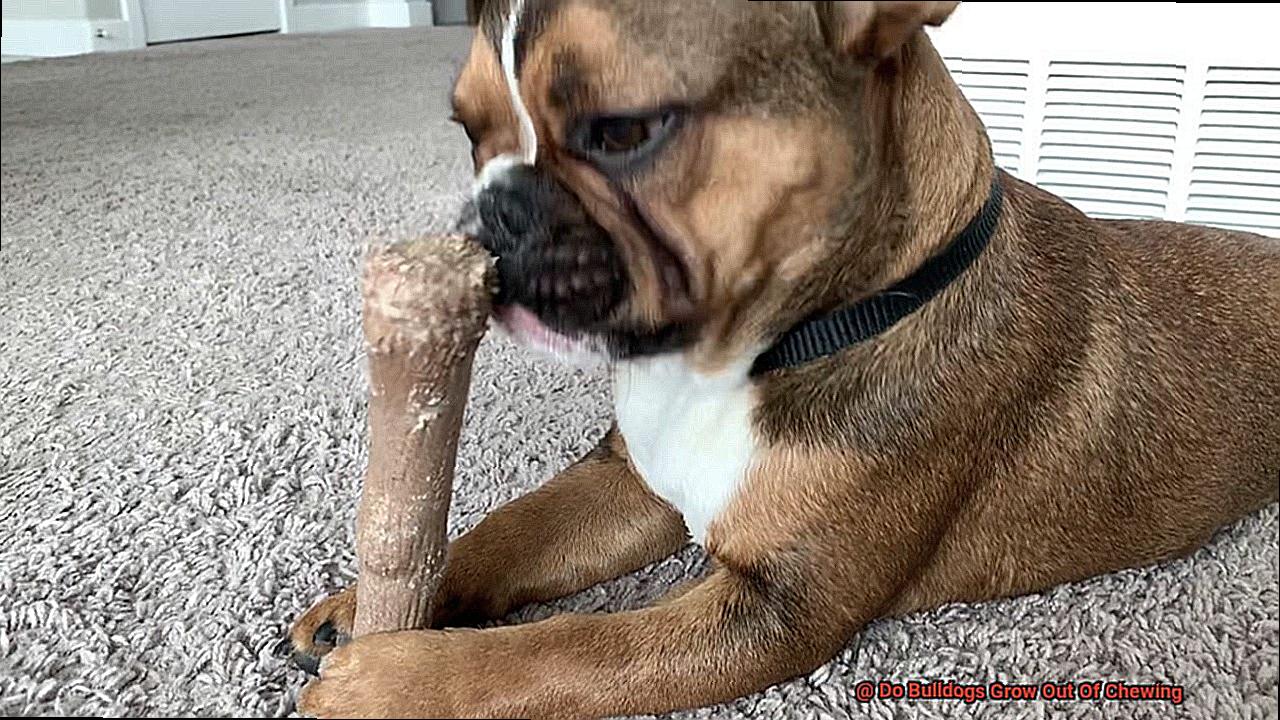
Understanding the Teething Phase
Picture this: your French Bulldog pup is around 3 to 6 months old, and their mouth becomes a battleground between those baby teeth falling out and the adult teeth pushing through. It’s like a canine version of Shark Week. During this time, your pup may experience discomfort and itchiness, leading them to chew on anything they can sink their teeth into. It’s their way of finding relief. So, don’t be surprised if your favorite pair of slippers becomes their new chew toy.
Tips for Managing Chewing Behavior
Now that you know why your French Bulldog is chewing up a storm, let’s talk about managing their chewing behavior. Here are some tips to help you steer clear of any unnecessary destruction:
- Provide appropriate chew toys: Make sure to have a variety of safe and durable chew toys available for your Frenchie. This will redirect their chewing instincts onto appropriate items instead of your furniture or shoes.
- Watch for signs of boredom or anxiety: Bulldogs are clever little rascals who need mental and physical stimulation. If they’re chewing excessively, it could be a sign that they’re bored or anxious. Keep them entertained with interactive toys or consider increasing their exercise routine to tire them out.
- Positive reinforcement training: Bulldogs respond well to positive reinforcement training techniques. When they chew on their toys instead of your belongings, praise them and offer treats as rewards. This will reinforce their good behavior and encourage them to continue chewing on appropriate items.
- Seek professional guidance if needed: If your French Bulldog’s chewing behavior persists or becomes destructive, it’s always a good idea to consult with a veterinarian or professional dog trainer. They can assess the situation and provide tailored recommendations to address the underlying causes of the chewing.
Remember, every Bulldog is unique, and some may naturally outgrow excessive chewing as they mature. However, it’s essential to be proactive in managing their chewing behavior to prevent any long-term habits from forming.
Providing Appropriate Chew Toys
Bulldogs are notorious chewers, and providing appropriate chew toys is essential to redirect their chewing behavior. Here are some tips on choosing and using chew toys for Bulldogs:
- Consider their size, age, and chewing strength: Bulldogs come in different sizes, and it’s important to choose toys that are suitable for their size. Toys that are too small may pose a choking hazard, while toys that are too hard may damage their teeth. Also, take into consideration their age and chewing strength. Puppies may need softer toys to alleviate teething discomfort, while adult Bulldogs may require more durable toys.
- Opt for safe and durable materials: Look for chew toys made from safe and durable materials. Soft rubber toys, such as Kong toys or Nylabones, are popular choices for Bulldogs. They provide a satisfying chewing experience and can be filled with treats or peanut butter to make them more enticing. Rope toys are also great options as they provide a textured surface for chewing and can help clean their teeth.
- Avoid household item look-alikes: Bulldogs can easily confuse chew toys with household items like shoes or socks. To prevent destructive chewing habits, avoid giving them toys that resemble these items.
- Rotate and introduce new toys: Bulldogs can get bored easily, so it’s important to rotate their chew toys regularly. Introduce new toys periodically to keep them interested and stimulated. This will also prevent them from fixating on one particular toy.
- Supervise playtime: Always supervise your Bulldog when they’re playing with chew toys. Some dogs may try to break apart or swallow large pieces of the toy, which can be dangerous. If a toy becomes damaged or shows signs of wear and tear, replace it immediately.
Remember, providing appropriate chew toys is just one part of managing your Bulldog’s chewing behavior. It’s also important to provide them with plenty of physical and mental stimulation through regular exercise, interactive play sessions, and training. If your Bulldog continues to exhibit excessive chewing behaviors despite having access to appropriate chew toys and stimulation, consult with a veterinarian or professional dog trainer for additional guidance and solutions.
Training and Positive Reinforcement Techniques
French Bulldogs are notorious chewers, but with the right training and positive reinforcement techniques, you can help them overcome this habit. In this section, we will delve into the importance of training, consistency, mental stimulation, suitable chew toys, and patience in curbing chewing behavior.
- Training from an Early Age: Start training your French Bulldog early to establish good habits and boundaries. Use positive reinforcement techniques like rewards, praise, and treats to encourage desired behaviors. When your pup chews on appropriate items like toys or bones, shower them with praise and treats – they’ll be wagging their tails faster than a greyhound chasing a rabbit.
- Consistency is Key: Set clear rules and boundaries about what is off-limits for chewing. Gently correct your Bulldog if they chew on inappropriate items and redirect their attention to a suitable chew toy or bone. Remember, consistency is as important as a daily dose of kibble.
- Mental Stimulation and Physical Exercise: Bulldogs are intelligent and energetic dogs – they need activities that engage their minds and tire them out physically. Engage in regular play sessions, take them for walks or runs, and provide puzzle toys or interactive games that challenge their problem-solving skills. A tired Bulldog is a well-behaved Bulldog.
- Variety of Suitable Chew Toys: Make sure your Bulldog has access to a range of suitable chew toys with different textures and sizes. Look for durable toys designed for strong chewers – they should be tough enough to withstand their powerful jaws. Avoid giving them items that resemble things they should not chew on, like old shoes or socks – you don’t want them thinking your favorite sneakers are fair game.
- Patience is Crucial: It takes time for Bulldogs to learn what is acceptable behavior. Consistently reinforce positive behaviors with rewards and redirect them when they engage in inappropriate chewing. Avoid punishment or scolding, as this can create fear or anxiety. Remember, Rome wasn’t built in a day, and neither is a well-behaved Bulldog.
Mental and Physical Stimulation for Bulldogs
French Bulldogs are adorable and affectionate companions, but they have a natural inclination towards chewing. This behavior can persist into adulthood if not properly addressed. However, fear not. With the right mental and physical stimulation, you can redirect your Frenchie’s chewing behavior onto appropriate items and save your favorite shoes from becoming their next chew toy.
Mental Stimulation:
Mental exercise is essential for keeping your French Bulldog’s mind active and preventing boredom-induced chewing. Here are some tips to provide mental stimulation:
- Puzzle toys: Invest in interactive puzzle toys that challenge your Frenchie’s problem-solving skills while rewarding them with treats or kibble. This will keep them engaged and entertained for hours.
- Interactive games: Engage in stimulating games like hide-and-seek or treasure hunts, where you hide treats around the house for your Frenchie to find. This taps into their natural instincts and provides mental stimulation.
- Obedience training: Training sessions not only teach your Frenchie important commands but also offer mental stimulation. Use positive reinforcement techniques, such as treats and praise, to keep them motivated and focused.
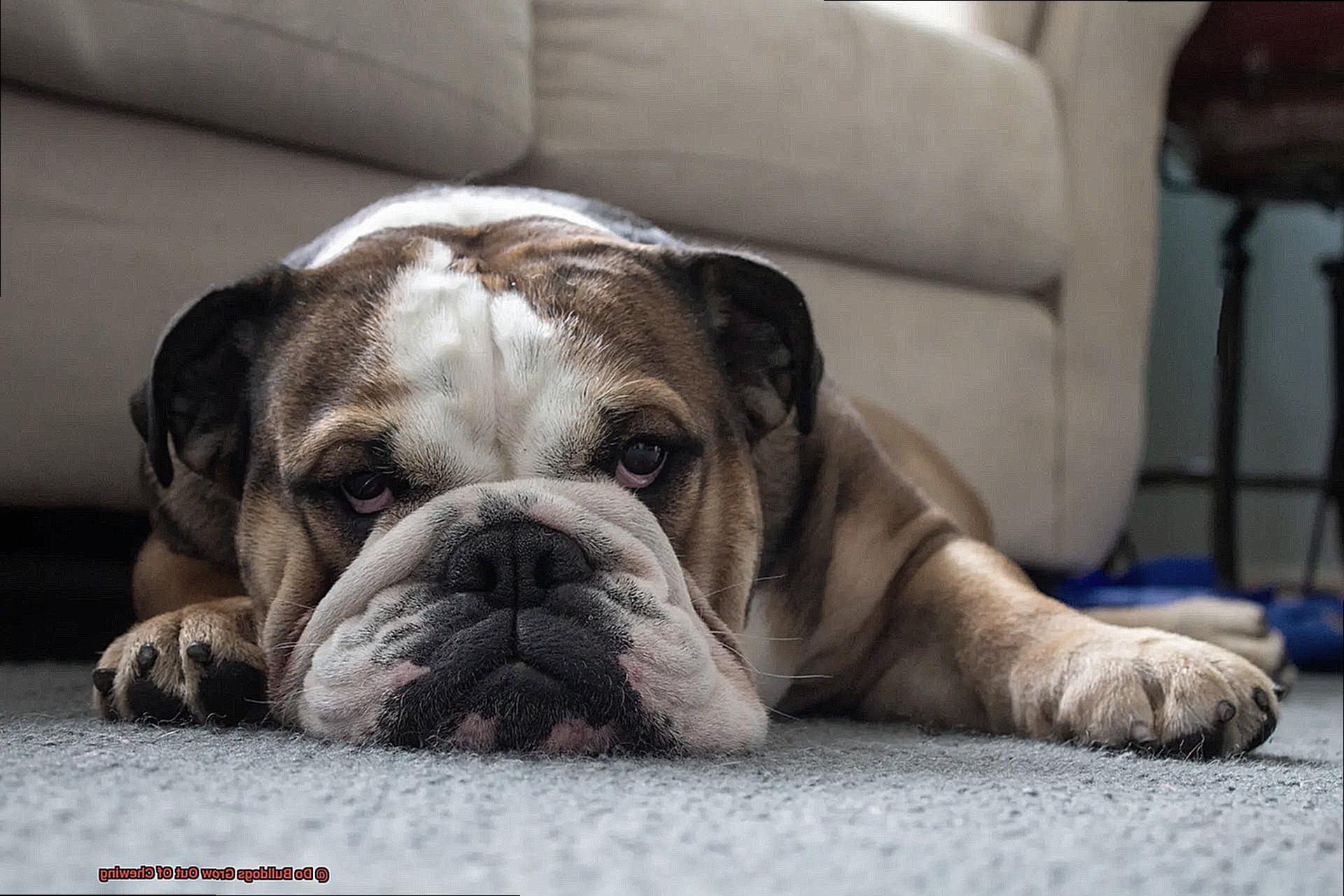
Physical Stimulation:
Physical exercise is equally crucial for Bulldogs as it helps burn off excess energy and redirects their chewing tendencies. Consider the following:
- Daily walks: Take your Frenchie for regular walks to provide them with physical exercise and mental stimulation. Vary the routes to keep things interesting for both of you.
- Playtime at the park: Allow your Frenchie to socialize and burn off energy by having supervised playtime with other dogs at a dog park. The interaction will stimulate their mind and tire them out.
- Swimming: If your Frenchie enjoys water, swimming can be an excellent form of exercise. It is low impact on their joints while providing a full-body workout.

Socialization:
Bulldogs are naturally social dogs, so regular interactions with people and other animals can keep them mentally stimulated and prevent boredom-induced chewing. Arrange playdates with other friendly dogs or involve them in group training classes to enhance their social skills.
Chew Toys:
Provide a variety of chew toys specifically designed for Bulldogs to redirect their chewing behavior onto appropriate items. Opt for durable toys that cannot be easily destroyed or swallowed. Variety is the spice of life, so offer toys with different textures and shapes to keep your Frenchie interested.
By incorporating mental and physical stimulation into your French Bulldog’s daily routine, you can redirect their chewing behavior onto appropriate items and save your belongings from destruction.
Engage their minds with puzzle toys and interactive games, provide regular exercise, promote socialization, and offer a range of safe chew toys. Remember, consistency and patience are key in training your Frenchie to become a well-behaved and happy companion.
Separation Anxiety and Other Behavioral Issues
Causes of Separation Anxiety:
- Breed Characteristics: Bulldogs, especially French Bulldogs, are known for their strong attachment to their owners. They thrive on human companionship and may become anxious when left alone.
- Early Experiences: Bulldogs that have experienced traumatic events or have been separated from their littermates too early may be more prone to separation anxiety.
- Lack of Training: Bulldogs that have not been properly trained or socialized may struggle with being left alone, leading to separation anxiety.
Solutions for Separation Anxiety:
- Gradual Desensitization: Start by leaving your Bulldog alone for short periods and gradually increase the duration over time. This helps them become more comfortable with being alone.
- Interactive Toys and Puzzles: Provide mental stimulation for your Bulldog by offering interactive toys and puzzles that keep them occupied while you’re away.
- Safe and Comfortable Space: Create a safe and comfortable area for your Bulldog when they are left alone. Use a crate or a designated room with their bed, toys, and familiar scents.
- Consistent Routine: Establish a consistent daily routine for your Bulldog, including feeding times, exercise, playtime, and rest periods. This helps them feel more secure and reduces anxiety.
- Professional Help: If your Bulldog’s separation anxiety persists or worsens despite your efforts, consider seeking help from a professional dog trainer or behaviorist who specializes in separation anxiety in Bulldogs.
Causes of Destructive Chewing:
- Boredom: Bulldogs that are not provided with enough mental and physical stimulation may resort to destructive chewing as a way to relieve boredom.
- Teething: Bulldogs, especially puppies, may chew on objects as their teeth develop and provide relief from teething discomfort.
- Separation Anxiety: Bulldogs with separation anxiety may engage in destructive chewing as a response to their anxiety and distress.
Solutions for Destructive Chewing:
- Provide Safe Chew Toys: Offer a variety of safe chew toys that are appropriate for your Bulldog’s age and chewing habits. This helps redirect their chewing behavior to more suitable objects.
- Supervision and Management: Keep an eye on your Bulldog when they are exploring the house, especially during teething phases. Use baby gates or crate training to limit access to areas with valuable or dangerous items.
- Training and Positive Reinforcement: Teach your Bulldog appropriate chewing behavior through positive reinforcement training. Reward them when they chew on their toys instead of inappropriate objects.
- Exercise and Enrichment: Ensure your Bulldog receives enough physical exercise and mental stimulation through daily walks, playtime, and interactive games. This helps reduce boredom and the need for destructive chewing.
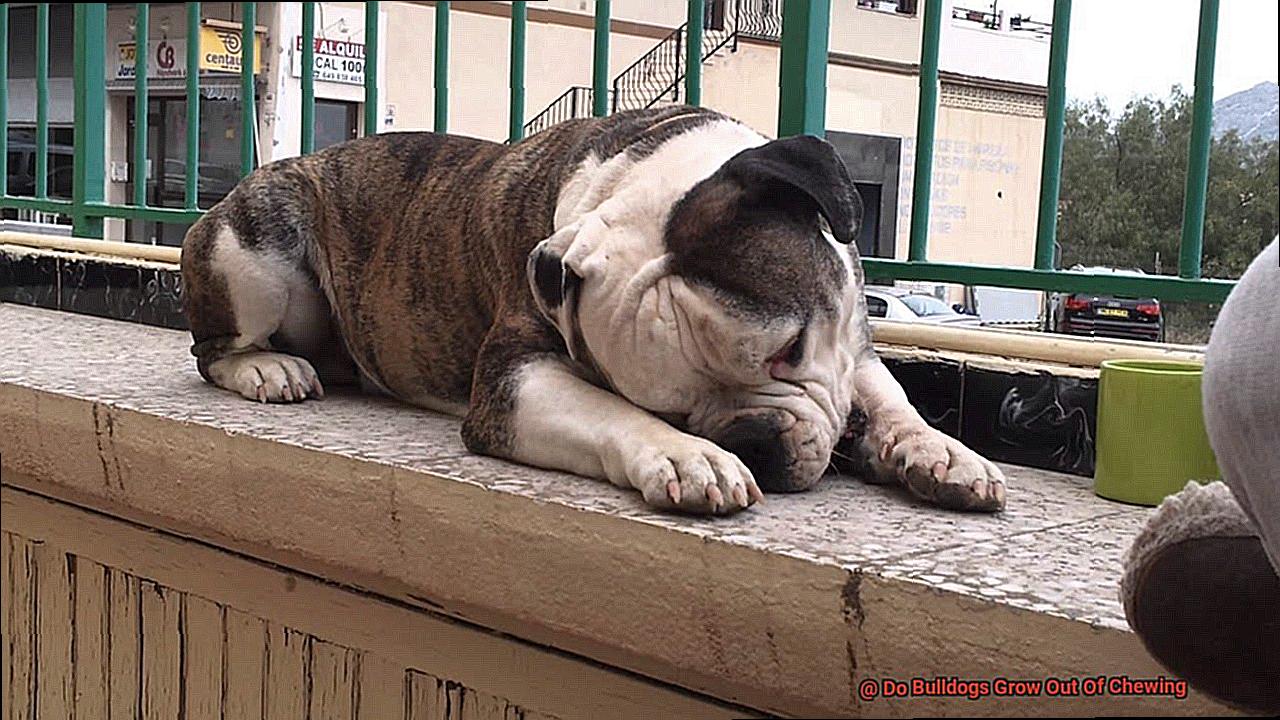
Managing Destructive Chewing in Bulldogs
French Bulldogs are adorable and lovable pets, but their strong chewing instinct can sometimes lead to destructive behavior. As a French Bulldog owner, it’s important to understand why Bulldogs chew excessively and how to manage this behavior effectively. In this guide, I’ll share my expertise and provide practical tips to help you curb destructive chewing in your beloved French Bulldog.
Understanding the Reasons Behind Destructive Chewing:
Chewing is a natural behavior for dogs, including French Bulldogs. It helps them relieve stress, exercise their jaws, and explore their environment. However, excessive chewing can be a sign of boredom, anxiety, teething, or a lack of proper training. Identifying the underlying reasons behind your Bulldog’s destructive chewing is the first step towards finding a solution.
Tips for Managing Destructive Chewing:
- Provide Appropriate Chew Toys: Bulldogs need durable and safe chew toys to redirect their chewing behavior. Look for toys specifically designed for strong chewers and rotate them regularly to keep them interesting.
- Training and Positive Reinforcement: Teach your French Bulldog commands like “leave it” and “drop it” to redirect their focus away from inappropriate chewing objects. Reward them with treats or praise when they choose to chew on their toys instead.
- Create a Safe and Enriched Environment: Set up a designated area with your Bulldog’s toys and bedding to create a safe space for them. Make sure they have access to appropriate chew items at all times.
- Regular Exercise: Bulldogs require daily exercise to release energy and reduce anxiety that may contribute to destructive chewing. Take them for walks or engage in interactive play sessions to satisfy their physical and mental stimulation needs.
- Seek Professional Help if Needed: If your French Bulldog’s destructive chewing persists despite your efforts, consider consulting a veterinarian or a certified dog trainer for additional guidance and support.
Managing destructive chewing in Bulldogs requires understanding their natural instincts, providing appropriate chew toys, training, creating a safe environment, regular exercise, and seeking professional help if necessary. By implementing these strategies, you can significantly reduce the intensity and frequency of destructive chewing in your French Bulldog, ensuring a harmonious and chew-proof home.
Expert Opinions on Whether Bulldogs Grow Out of Chewing
French Bulldogs are undeniably adorable with their wrinkled faces and playful personalities. But there’s one behavior that can drive any owner mad – chewing. If you’re a proud French Bulldog parent, you’ve probably wondered if your furry friend will ever outgrow their chewing habit. We’ve consulted with experts in the field – veterinarians, dog trainers, and experienced bulldog breeders – to provide you with insights and tips on this common concern.
Chewing: A Natural Behavior
According to veterinarians, chewing is a natural behavior for dogs, especially during their teething stage. Bulldogs, with their prominent jaws and powerful bite, have an innate need to chew. So, it’s not surprising that your French Bulldog loves sinking their teeth into anything they can find.
Some Bulldogs May Outgrow It
While some bulldogs may outgrow their chewing habit, experts agree that it is not guaranteed and varies from dog to dog. The key is to understand the underlying reasons behind the chewing behavior.
Redirecting Chewing Behavior
Dog trainers suggest providing appropriate chew toys and engaging in regular exercise to redirect your bulldog’s chewing behavior. Interactive toys that challenge their minds can also help keep them mentally stimulated and less likely to resort to destructive chewing.
Behavioral Issues
It’s important to note that some bulldogs may continue chewing even into adulthood due to separation anxiety, boredom, or other behavioral issues. If your French Bulldog’s chewing habit persists despite your best efforts, consulting with a professional dog trainer or behaviorist may be necessary.
Insights from Experienced Breeders
Experienced bulldog breeders can provide valuable insights into the specific temperament and tendencies of bulldogs regarding chewing habits. They may also share tips on how to select a puppy with a lower likelihood of excessive chewing tendencies.
Factors That Influence Outgrowing Chewing
Proper training, socialization, and mental stimulation play a significant role in whether a bulldog will eventually grow out of chewing. Consistency and patience are key when it comes to establishing boundaries and teaching your French Bulldog what is acceptable to chew on.
Managing Chewing Behavior
Experts suggest using bitter-tasting sprays on furniture or other items that your bulldog may target for chewing. This unpleasant taste discourages them from continuing the behavior. Additionally, providing a variety of chew toys and rotating them regularly can help keep your French Bulldog engaged and less prone to destructive chewing.
Conclusion
In conclusion, it is important to understand that Bulldogs may not necessarily grow out of their chewing habits.
While some Bulldogs may naturally outgrow this behavior as they mature, many will require consistent training and management throughout their lives. It is crucial for owners to provide appropriate chew toys and redirect their Bulldogs’ chewing instincts towards acceptable outlets.
By being patient, consistent, and proactive in addressing this behavior, Bulldog owners can minimize the damage caused by chewing and create a harmonious living environment for both themselves and their furry companions.
